|
10/2/2018 0 Comments REAL LIFE USES OF ECONOMICSEconomics was one of my favourite subjects in high school and college, until I went to university. Clever people decided it would be fun to switch the Demand and Supply curves over, making me doubt what I had learnt so far in its entirety. I will therefore ignore the things that I never understood and stick to the simpler (and in my opinion, better) theories, whether these are applied to dating, making decisions, job searches or money and happiness. 1. demand & supply: on dating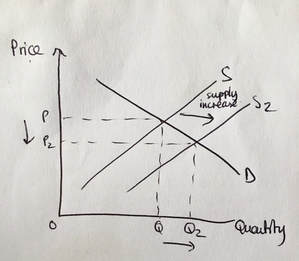 Cities are full of time-poor, impatient, career-driven, social, independent people who go to the gym, drink protein shakes, do adventurous things like skydiving while traveling the world. Often this means that there is high demand for efficiency when it comes to 'finding love' in the limited amount of spare time that they may have remaining. And so, the online (or mobile) dating world was born and a large supply of apps and websites emerged to keep our thumbs and shallow brains occupied for hours of swiping. Since Match.com was introduced in the 1990s, a lot has changed. Tinder is obviously the most well-known of them all (I'm not sure if it still qualifies as a 'dating' app), but there's now a wide range of adaptations such as: Happn, Coffee meets Bagel, Bumble, the League, Hinge... I could fill this page with a list, but you get the picture. Since 2007, the online dating industry has boomed, whether it's because of changes in lifestyle, increased use of mobile, advancements of technology, transparency of the supply of men and women, or the inherent laziness of human beings. The effect? The value assigned to a 'date' is no longer what it used to be. 2. Opportunity cost: on decision making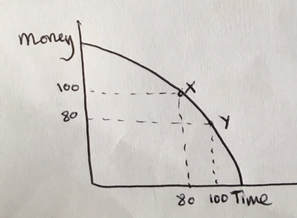 "A benefit, profit, or value of something that must be given up to acquire or achieve something else." - Business Dictionary Say I was perfectly happy with a job that pays me $80, which gave me 100 minutes of free time. But then I decide to make an extra $20. This will result in me losing 20 minutes of my free time. Benefit: more money; Opportunity cost: less free time. Equally, if I want to eat a bucket of fried chicken, the opportunity cost of eating 1200 calories of protein, fat and carbs, is the 3 days I spent sweating in the gym. Benefit: pure joy of eating greasy junk food; Opportunity cost: health. 3. swot analysis: on interviewing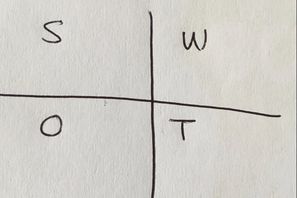 When I graduated, I went to over 60 interviews in 16 companies in the space of a couple of months. By the end of the process, I was close to borderline insanity, irritable, overly sensitive, and almost started smoking (I didn't, just in case my parents read this). On a more positive note, I realised how important it is to be clear on what you're good and bad at (your strengths and weaknesses), where you could improve your skills and knowledge (opportunities) and what could limit your personal growth (threats). Create your own SWOT here (Credit: Jodie Shaw) 4. LAW OF DIMINISHING RETURNS: money vs. HAPPINESS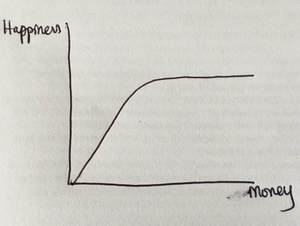 For people living in poverty, who don't have enough money to feed their families or fix a leaking roof, or build a place to live in, money can buy happiness, as they can buy what they need to watch their families survive and grow (beginning of the diagram). At the age of 20, like many young girls, money bought me things that I had been eyeing up for a long time: an overpriced bag, expensive make up, shoes and clothes, all of which gave me a thrill of being able to spend money on things that I wanted. As years pass, the levels of excitement from new possessions have reached a plateau, where the law of diminishing returns kicks in (second half of the diagram). Don't get me wrong, I still love shopping, but more as a way to spend time, de-stress and gain temporary happiness. For instance, I would no longer apply for a job if it compromises on my 'free time' (going back to 'Opportunity cost'). From personal experience, and after observing my parents who are impossible to buy presents for, I feel that over the long run, additional money (on top of what you need to survive), can buy more experiences, quality (over quantity), and can act as an enabler for happiness. For example, when my parents and brother bought me a laptop for my birthday, I was clearly happy. Not because I have a shiny new toy, but because I can spend more time writing (well, typing), which makes me happy. 5. prisoner's dilemma (GAME THEORY): on trust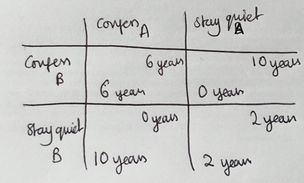 This is my favourite one as it ties in various aspects of human behaviour such as trust, betrayal, decision-making, risk and opportunity costs. A quick recap, this is not really a theory, but more of a situation: 2 prisoners commit a crime and are locked up in separate cells. They are interrogated separately, and need to decide on whether they should confess to the crime, or stay quiet. In either situation, if their action doesn't match the other's, one or the other will end up with 10 years in prison, but there is the temptation of being able to be set free by confessing, in case the other doesn't. It raises the question of what you would do if you were in that situation... On a lighter note, this could also be applied to my favourite subject: dating apps. Most have been considerate enough to not let the other person know if you 'like' them (or swiped right), but some less considerate ones let the other person know that. There's therefore the risk (and utter shame and heartbreak) from a non-reciprocal swipe to the left. If you're in the dating scene for long enough, hopefully you'll stop caring, though. In summary, from personal experience, economics and psychology probably go hand in hand in many respects. These simple theories can give certain situations a 'name' or some structure that can help us get some clarity and perhaps some perspective. I'm sure there are many more applications, especially if you are one of those clever people who know more about the different Demand and Supply curves. Please do feel free to enlighten me (and others who feel my pain).
0 Comments
Your comment will be posted after it is approved.
Leave a Reply. |
Home |
Categories |
|
 RSS Feed
RSS Feed